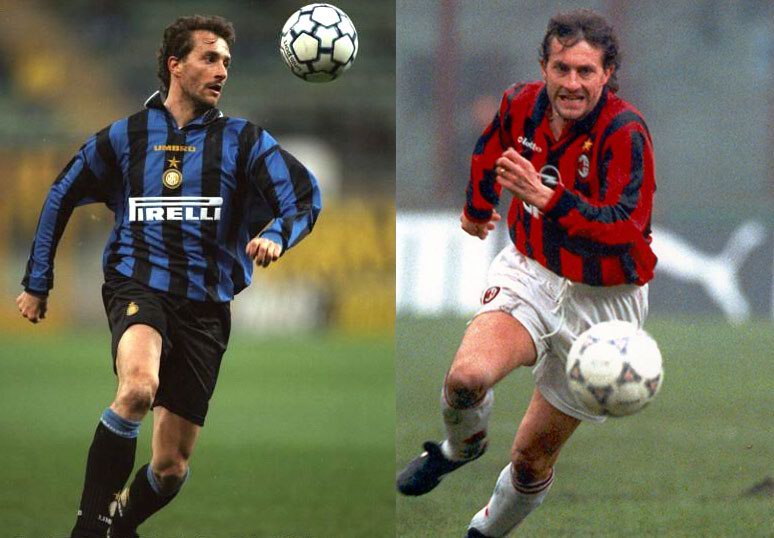“The problem is that clubs load young players up with money before [their careers] have taken off. At that point, once they have their cash, it’s normal that they start behaving in this way. In my day, players had to prove themselves on the pitch and show our value, beforehand, there was love for the club and for the group, now everyone thinks of themselves – they pay you before you play.” – Maurizio Ganz on Mario Balotelli (2009)
Maurizio Ganz was in righteous mood back in October 2009 as he lamented the individualistic nature of the younger generation. He was angry with Inter’s young upstart Mario Balotelli after the player had tried to steal a penalty from Samuel Eto’o in a game against Palermo. Javier Zanetti had to pull Balotelli away and this infuriated Ganz, who told Tuttomercatoweb that this simply wouldn’t have happened in his day. The irony is that ‘back then’ things were not much different, and his idea that there was ‘love for the club’ can be questioned by looking at his own career.
Back then as Ganz was lambasting ‘Super Mario’, the youngster was in good form. This was the start of Inter’s treble season but, his antics were enough for the former Nerazzurri striker to see red. What would he have said had he known that Balotelli would soon don the red and black of Milan? Surely he would hit the roof? The irony is Ganz himself did just this in the 1990s and moved across the city. Balotelli at least put a spell in England between doing so; Maurizio did not. The injustice of it is that Ganz’s move was not considered treachery, albeit many others cross the divide with ease. Balotelli and Ronaldo perhaps provoked some of the harshest resentment, but Ganz’s cult status afforded him a break.
It is this cult status that has allowed him in some respect to trade on his own myth. His criticism of Balotelli highlighted this. Another aspect of the myth is the nickname he earned at Inter—’He-always-scores’—because, quite frankly, he didn’t.
The striker had scored 29 goals in 70 appearances for Brescia in Serie B and was top scorer in that division in 1992. His move to Atalanta saw him continue a similar pattern as he notched 37 times in 70 games. Ganz wasn’t prolific but he was a typical number nine and seemed to often score important goals, thereby etching him in the memory. Aficionados of Serie A will remember him from his days in Bergamo as he often netted against the big boys.
His time in Milan began when he transferred to the Nerazzurri in 1995. This was a difficult time for Inter and they had spent big on Paul Ince and Roberto Carlos. Zanetti also arrived that season and thus Ganz’s appearance did not turn too many heads. Playing second fiddle to Marco Branca he scored 13 goals as Inter finished an uninspiring seventh, but it was a season that he will be remembered for by Inter fans more than anyone else that year.
Inter reached the UEFA Cup semi-final and Ganz was top scorer with eight goals in that competition. His ability to finish important chances in important games earned him his nickname—ten goals in 16 European appearances during his time with the Nerazzurri eludes to the crucial nature of his finishing, but it is not quite accurate. He left Inter in 1997 with 26 goals in 68 games, hardly prolific. Balotelli managed 20 in 59, just for the record.
So, to recap, players ‘back then’ showed love for the club and the group. Right? Wrong.
Ganz moved across town to Milan and spent time on the bench as George Weah and Andriy Shevchenko were much more talented and much more prolific. Yet talk to anyone associated with the Rossoneri back then and they will confirm his cult hero status.
In his first season Milan reached the Coppa Italia final and Ganz once again helped with a crucial goal to get them there. The second season they won the Scudetto, and Maurizio would come off the bench to act as a super sub again, netting some vital goals and making the team and fans eternally grateful. Finally, in a Coppa Italia clash against his old club, Inter, he scored a hat-trick, making sure his name would forever be blessed in the city. He finished his career with Milan in 2001 having scored just nine goals in 40 appearances, though he left as a revered man. Balotelli, for the record, notched 23 in 46 games for the Rossoneri.
Ganz’s career would continue until he retired in 2007. He scored crucial goals at Venezia, Fiorentina, Ancona, Modena, Lugano and Pro Vercelli and, if you ask any of the fans from these clubs, he is no doubt thought of fondly. For a man with the nickname ‘He-always-scores’, it is surprising that he only hit 166 goals in 524 appearances. Rather, it was the quality and critical nature of the goals that earned him cult status, especially on both sides of Milan.
Perhaps a more appropriate nickname for a man who was so consistently in the right place at the right time whould have been “Why always me?”.
Words by Richard Hall @Gentleman_Ultra
Richard is the founder of The Gentleman Ultra and an Italian Football Writer contributing to @Guardian_sport, @FootballItalia, @CmdotCom, @SiriusXMFC and beINSPORTUSA

